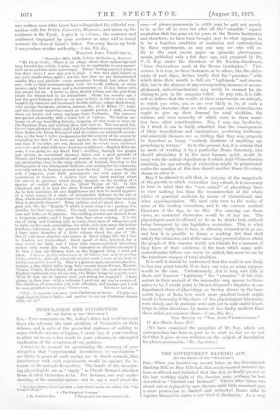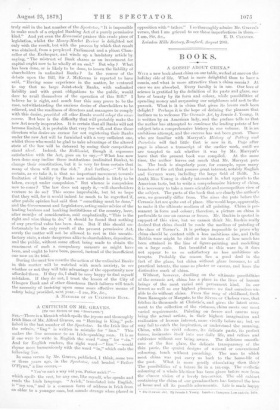THE GOVERNMENT BANKING ACT.
(TO THE EDITOR OF THE "SPEOTATOR.1
SIR,—Since you inserted my second letter on the Government Banking Bill, on May 17th last, that much-vaunted measure has been so altered and curtailed that the Act, as finally passed on the last working night of the Session, may, perhaps, he best described as " Limited and Reduced." Clause after clause was struck out or replaced by new clauses, until little remained save a mere permission to limited and unlimited Banks alike to register themselves under a new kind of limitation. As is very truly said iu the last number of the Spectator, "It is impossible
to make much of a crippled Banking Act of a purely permissive kind." And yet even the Economist praises this crude piece of legislation, whilst the Money-Market Review is delighted not only with the result, but with the process by which that result was obtained, from a perplexed Parliament and a pliant Chan- cellor of the Exchequer, and winds up a laudatory article by saying, " The mistrust of Bank shares as an investment for capital ought now to be wholly at an end." But why ? What has been done, or is likely to be done, to lessen the liability of shareholders in unlimited Banks P In the course of the debate upon the Bill, Sir J. McKeuna is reported to have said, "Having some experience in the matter, he ventured to say that no large Joint-stock Banks, with unlimited liability and with great obligations to the public, would dare to avail themselves of the operation of this Bill." I believe he is right, and much fear this may prove to be the case, notwithstanding the anxious desire of shareholders to be relieved, and the readiness of directors and managers to comply with this desire, provided all other Banks would adopt the same course. But here is the difficulty that will probably make the now Act nearly inoperative. It is certain that all Banks will not become limited, it is probable that very few will, and thus those directors who desire an excuse for not registering their Banks under the new Act will be furnished with a very sufficient one, whilst those who would be glad to take advantage of the altered state of the law will be deterred by seeing their competitors stand aloof. Indeed, the Bullionist, though it expresses satisfaction with the Act, goes on to say,—" What has now been done may incline these institutions (unlimited Banks), to change their constitution, but it is very far from certain that many of them will run the risk." And further,—" What is certain, as we take it, is that no important movement towards limitation of liability by Banks now unlimited is likely to be taken, except under compulsion." But whence is compulsion now to come P The law does not apply it—will shareholders venture to do so ? This seems improbable, but let us hope that they will, for it would indeed be much to be regretted, if, after public opinion had said that " something must be done," and the Government and Legislature, acting under advice of the leading bankers and banking institutions of the country, have, after months of consideration, said emphatically, " This is the right and wise thing to do," it should be found that nothing of any practical value has been done. But if this should un- fortunately be the only result of the present permissive Act, surely the matter will not be allowed to rest in this unsatis- factory state, a state dangerous alike to shareholders, depositors, and the public, without some effort being made to obtain the enactment of such a compulsory measure as might have been, and ought to have been, passed, instead of the insufficient one now on its trial.
During the next'few mouths the action of the unlimited Banks in this matter will be watched with much anxiety, to see whether or not they will take advantage of the opportunity now afforded them. If they do, I shall be very happy to find myself mistaken. If they do not, I trust the lesson of the City of Glasgow Bank and of other disastrous Bank failures will teach the necessity of insisting upon some more effective means of safety being provided, next year.—I am, Sir, 47.c., A MANAGER 01' AN UNLIMITED BANK.































 Previous page
Previous page